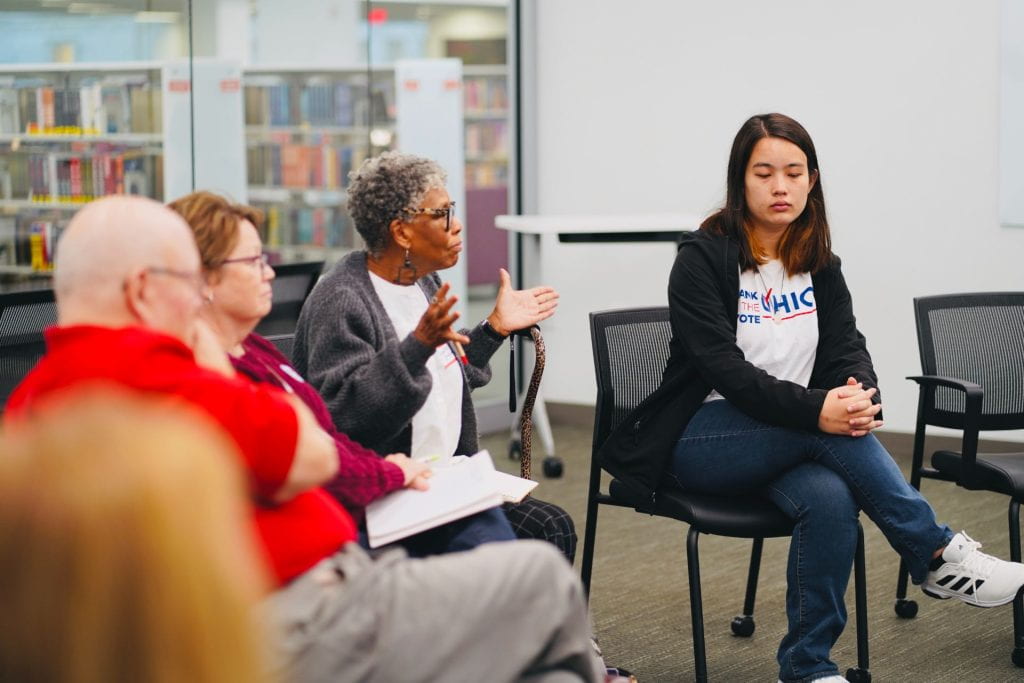
The Agenda
When you arrive, participants will vote on the topics submitted at registration to determine the agenda for the day.
View the topics radar see session ideas already submitted by participants!

See what we talked about at last year’s Unconference.
Lunch Panel Discussion: Hot Button Issues – Sustaining Democracy in a Warming World
We are seeing the impact of Global Warming now, but can our political system respond quickly enough? As the climate crisis coincides with erosion of democratic institutions, we need to explore ways to sustain our voices and the livability of our planet. And while those most impacted by a warming world often experience the most exclusion in democratic decision making, we will use this session to explore places where activists, scholars and community members are crafting solutions to climate change through political power.
1 hour CE credit.
Franklin Davis, Director of Climate and Democratic Organizing, Ohio Environmental Council
Franklin Davis is a proud native of Washington DC and a graduate of The Ohio State University. He is a fan of all things DC or Ohio State sports. #DCStandUp and Go Bucks!!! He is an avid outdoorsman, coach, athlete, seeker of knowledge, and self-described “policy nut”. He has a wide range of policy interests and is ecstatic to be able to work in the environmental justice space and combine some of his passions.
Franklin is the Director of Climate and Democracy Organizing for the OEC, overseeing the Reynoldsburg Climate Campaign, as well as supporting the efforts of the Democracy and c(4) teams.
He is passionate about preserving the right to vote, and has spent over a decade actively working to defend that ideal. He is currently a Voting Location Manager for the Licking County Board of Elections.
Franklin is an active member of his community. He currently coaches about 17 months a year, and is a member of various Central Ohio organizations including Central Ohio Young Black Democrats, Young Democrats, and the Columbus Alumni Chapter of Kappa Alpha Psi Fraternity. He currently resides in Reynoldsburg, with his amazing wife Tenile, their children Christian, Franklin, Madison, and Kingston, as well as their dog, Buckeye.
Bailey Fullwiler, MSSA, LSW, Eco Social Worker, Workplace Health Manager
Bailey Fullwiler is a community social worker and trauma-informed yoga and meditation instructor in Central, Ohio. She currently serves as a statewide mental health first aid training coordinator with Mental Health America of Ohio and a co-hort member of the Ohio Environmental Leaders Intiative. Bailey is looking forward to bringing an ecological lens to her work with IAVSW to acknowledge the human-animal bond with non-domesticated species and how our work can support healthy environments for all living beings. Her approach to this work is rooted in seeking the intersection of self care and collective care within a social justice framework to best provide a strong culture of wellbeing.
For the past 3 years, Bailey has researched ecological grief and partnered with environmental organizations to address climate emotions, burnout, and trauma within their workforces. In addition, Bailey has consulted with frontline community organizers to facilitate events to mourn the loss or degradation of landscapes and species throughout the midwest.
Dr. Smitha Rao, Assistant Professor, Ohio State University College of Social Work
Dr. Smitha Rao’s work at the intersection of environment, development, and social policy is informed by her interdisciplinary background in social work and human geography. Her research interests include: (1) extreme weather events and contextual vulnerability, (2) improving adaptive capacities among communities to deal with climatic and other stressors, and (3) effects of air pollution on environmental health and improving access to clean energy. Dr. Rao has over a decade of macro-practice experience spanning academic and not-for-profit settings. This included post-disaster community-based reconstruction and rehabilitation efforts, campaign strategy and design for local and international environmental organizations on climate change, phasing out toxins from industry, and promoting sustainable agriculture practices. Her current work encompasses social vulnerability in the context of disasters and disaster risk reduction to develop knowledge and inform policies centering underserved communities. Her interdisciplinary work touches upon climate change implications for vulnerable groups, energy poverty, anti-oppressive praxis, and ecological justice.